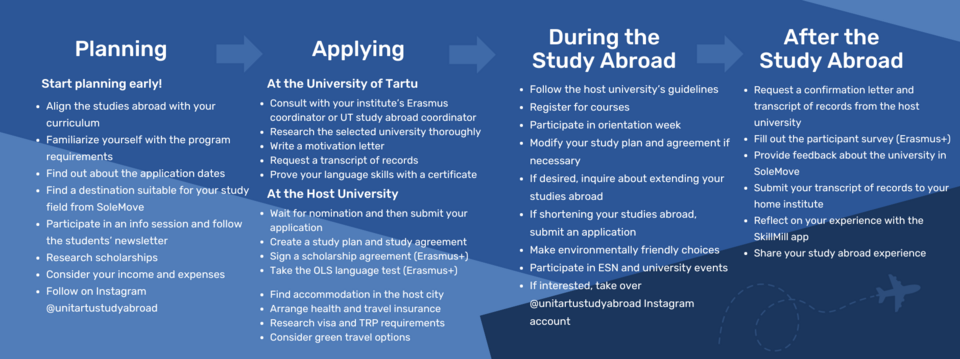Studies abroad: what to know about planning your study abroad experience
Each year, a large number of students at the University of Tartu spend time studying abroad. You can locate study abroad programmes on your own, or you may take advantage of one of the many opportunities offered by the university. While you are abroad, you remain enrolled as a student of the University of Tartu; the courses you complete there will be credited toward your studies at UT and your studies abroad will be reflected in your graduation documents. You can study abroad for one semester or for an entire academic year at a time, and with sufficient planning, you can even do it more than once.
As an exchange student, you will study for free at a foreign university; you may also receive a stipend or other forms of financial support.
To ensure that your application for exchange studies and your subsequent studies abroad run as smoothly as possible and that there are no major obstacles, the application process must be carefully thought out and planned. Here are some recommendations.

Tips for planning
- Think about your aim – do you want to study abroad or would you prefer to gain experience by undergoing a traineeship abroad?
- Consider that the process of planning your time abroad can take a year to a year and a half.
- Keep in mind that your exchange studies are counted as a part of your studies at UT.
Study abroad options offered by UT
- The majority of students at the University of Tartu study abroad with the European Union's Erasmus programme, through which specific departments of the university carry out student exchange cooperation with over 500 universities across Europe and also outside of Erasmus+ Europe programme countries. Program participants are guaranteed free tuition and a grant. Erasmus also offers grants for traineeship abroad.
- A significant number of student exchanges take place under student exchange agreements between UT and its partner universities in USA, Asia, Australia etc. Funding options vary from university to university.
- In addition, the University of Tartu is a member of the ISEP exchange programme, which offers study opportunities in America and other parts of the world (over 320 universities in 50 countries). These universities guarantee free tuition, accommodation and meals (or an allowance to cover meal costs).
- As a member of the Utrecht Network, the University of Tartu can also send exchange students to the universities of the AEN, MAUI and Reari-RJ networks. AEN is made up of 6 universities in Australia; MAUI comprises 18 universities in the United States; Reari-RJ is composed of 14 universities from the State of Rio de Janeiro, Brazil. Exchange students are guaranteed free tuition. Expenses for accommodation, food, travel, visa and study materials must be covered by the student.
Other scholarships
Please see more information available on our scholarship page.
- Keep an eye on the offers on the Competitions Currently Open webpage and on weekly student newsletter.
- Familiarise yourself through the section for exchange students on the website of the foreign university of interest with what they teach and at which level and in which language they provide instruction, what the academic calendar looks like, what the possibilities are for accommodation, etc. If necessary, you can contact the foreign university.
- Think about the expenses related to living abroad and consider whether you will be able to manage. You can find information about the possibility of free tuition, stipends, free accommodation and other benefits in the programme's/university's info materials or in the competition notice.
- You can look over diffrent scholarships options on our scholarship page.
Check the competition notice for the:
- terms and conditions of application and
- for which documents must be submitted in which manner,
- to whom and when to submit.
Follow the tips for applying abroad when prepariong your to application documents.
Make plans for proving your language skills – do you have an acceptable language certificate or do you have to register for a test? The competition notice specifies which certificates are acceptable (an international test, a test taken in the UT Language Centre, a certificate proving the completion of a language course, assessment of a language instructor).
Several competitions require a letter of recommendation from a teaching staff member of your specialization. Think about it early who you should turn to and give the teaching staff member sufficient information and time.
- Submit your documents to the proper person on time and in the manner specified in the competition notice. In most cases the applications are only processed via SoleMove system.
- All the documents must usually be (please read carefully what is needed):
- according to the competition original documents or certified copies and
- the letter of recommendation and letter of motivation must be signed by the author. - Keep in mind that the selection of UT is given notice of within two or three weeks, but the final decision is made by the foreign university and this may take several months, depending on the deadline of the university.
- The compliance with the requirements of the foreign university after being selected by the UT often presumes very fast and prompt actions.
Ask for advice!
- General study abroad enquiries studyabroad@ut.ee; let us know in case you have doubts due to your personal needs.
- Consider your plans with your supervisor or programme director.
- Make sure you are familiar with the study abroad regulations, if needed you may ask advice from UT Counselling Centre: noustaja@ut.ee or from your academic unit`s study coordinator.



